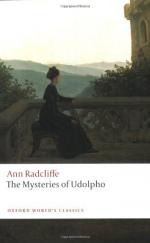|
This section contains 3,997 words (approx. 14 pages at 300 words per page) |

|
SOURCE: "Bathos and Repetition: The Uncanny in Radcliffe," in The Journal of Narrative Technique, Vol. 19, No. 2, Spring, 1989, pp. 197-204.
In this essay, Macdonald uses the critical theories of Tzvetan Todorov that relate to Gothic romance to maintain that Radcliffe, in The Mysteries of Udolpho, uses the fantastic satirically and with a didactic purpose.
The defining characteristic of the fantastic as a literary genre, according to Tzvetan Todorov, is the hesitation or uncertainty it produces in the reader (and sometimes in the characters) as to the fictional reality of supernatural phenomena [The Fantastic: A Structural Approach to a Literary Genre, trans. R. Howard, 1973]. The genre thus defined is extremely small: usually the supernatural events are either explained away, so that the fantastic becomes merely uncanny, or verified, so that it becomes marvelous.
Richard Howard translates Todorov's étrange as uncanny because Todorov himself invokes Freud's conception of the unheimlich, though...
|
This section contains 3,997 words (approx. 14 pages at 300 words per page) |

|


